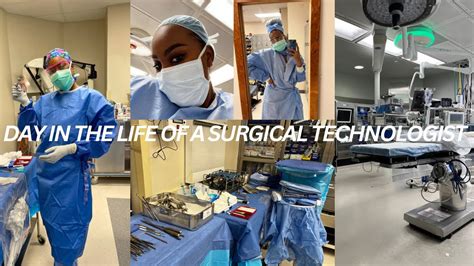Surgical technologists, also known as surgical techs or operating room technicians, play a crucial role in the healthcare industry. They are responsible for ensuring that the operating room (OR) is safe, efficient, and prepared for surgical procedures. Have you ever wondered what a typical day in the life of a surgical tech looks like? In this article, we will delve into the daily responsibilities, challenges, and rewards of being a surgical tech.
The Importance of Surgical Technologists
Surgical technologists are essential members of the surgical team, working closely with surgeons, anesthesiologists, and nurses to ensure that patients receive the best possible care. They are responsible for maintaining the sterile environment of the OR, preparing surgical instruments and equipment, and assisting during procedures. With the increasing demand for surgical services, the role of surgical technologists has become more critical than ever.
A Typical Day for a Surgical Tech
A typical day for a surgical tech begins early, often before 6:00 am. They arrive at the hospital or surgical facility, change into their scrubs, and head to the OR to start preparing for the day's procedures.

Their first task is to review the day's schedule, which includes checking the types of procedures, the surgeons and anesthesiologists involved, and the patients' medical histories. They then begin preparing the OR, which includes:
- Sterilizing equipment and instruments
- Setting up the surgical site with necessary supplies
- Preparing the patient's chart and medical records
- Ensuring that all necessary medications and equipment are available
The Surgical Tech's Role During Procedures
During procedures, surgical technologists play a vital role in maintaining the sterile environment and ensuring that the surgical team has everything they need. Their responsibilities include:
- Handing instruments to the surgeon
- Maintaining the integrity of the sterile field
- Monitoring the patient's vital signs and reporting any changes to the anesthesiologist
- Assisting with patient positioning and preparation
- Maintaining accurate records of the procedure

Challenges Faced by Surgical Technologists
Surgical technologists face several challenges on a daily basis, including:
- Maintaining the sterile environment in a fast-paced and dynamic environment
- Working long hours and being on their feet for extended periods
- Dealing with high-stress situations, such as emergency procedures
- Staying up-to-date with new technologies and procedures
- Communicating effectively with the surgical team and patients
The Rewards of Being a Surgical Technologist
Despite the challenges, many surgical technologists find their job highly rewarding. They have the opportunity to:
- Make a difference in patients' lives
- Work in a dynamic and fast-paced environment
- Develop close relationships with the surgical team
- Continuously learn and stay updated on new technologies and procedures

Education and Training
To become a surgical technologist, one typically needs to complete a post-secondary training program in surgical technology, which can last from several months to two years. These programs are offered at community colleges, vocational schools, and universities. Some common courses include:
- Anatomy and physiology
- Surgical procedures and techniques
- Patient care and communication
- Sterilization and infection control
- Medical terminology
Certification and Licensure
While certification is not always required, it is highly recommended. The National Board of Surgical Technology and Surgical Assisting (NBSTSA) offers the Certified Surgical Technologist (CST) credential, which is the most common certification for surgical technologists. Some states also require licensure to practice as a surgical technologist.

Job Outlook and Salary
The job outlook for surgical technologists is excellent, with the Bureau of Labor Statistics (BLS) predicting a 3% growth in employment opportunities from 2020 to 2030. The median annual salary for surgical technologists is around $48,000, although salaries can vary depending on location, experience, and employer.

Conclusion: A Rewarding Career in Surgical Technology
A career as a surgical technologist can be highly rewarding for those who are passionate about healthcare and enjoy working in a fast-paced environment. With the increasing demand for surgical services, the role of surgical technologists has become more critical than ever. By understanding the daily responsibilities, challenges, and rewards of being a surgical tech, we can appreciate the importance of this profession and the impact they have on patients' lives.






What is the role of a surgical technologist?
+A surgical technologist, also known as a surgical tech or operating room technician, is responsible for ensuring that the operating room is safe, efficient, and prepared for surgical procedures.
What education and training do I need to become a surgical technologist?
+To become a surgical technologist, you typically need to complete a post-secondary training program in surgical technology, which can last from several months to two years.
Is certification required to practice as a surgical technologist?
+While certification is not always required, it is highly recommended. The National Board of Surgical Technology and Surgical Assisting (NBSTSA) offers the Certified Surgical Technologist (CST) credential, which is the most common certification for surgical technologists.
